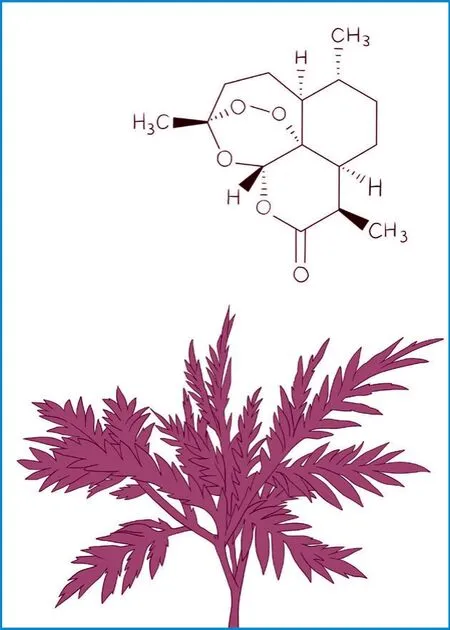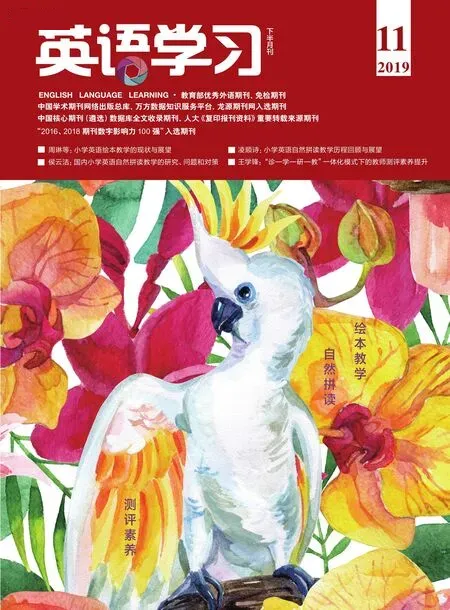The Discovery of Artemisinin1青蒿素的发现
2019-11-22

Born in Ningbo,Zhejiang in 1930,Tu Youyou has a very lovely name.According to an interview after being awarded the 2011 Lasker-DeBakey Clinical Medical Research Award,Youyou was given by her father,who adapted it from a sentence ofThe Book of Songs(诗经)“Deer bleat‘youyou’ while they are eating the wild herb namedHao”(“ 呦呦鹿鸣,食野之蒿 ”).It is this interesting coincidence that links Youyou’s whole life withqinghao(青蒿).
Early Life and Education
Before transferring to Ningbo Xiaoshi High School in 1948,Tu Youyou attended a junior high school.From 1951 to 1955,she attended Peking University Medical School (Beijing Medical College).Tu studied at the Department of Pharmaceutical Sciences,and graduated in 1955.Later,Tu was trained for two and a half years in traditional Chinese medicine.Ever since,Tu has worked at the Academy of Traditional Chinese Medicine in Beijing.
Awards and Research Career
Sitting at home watching TV,85-yearold Tu Youyou,knew she had won the prize.“It’s nothing special.It’s just something unexpected,but not very unexpected,”she said quietly.“It’s not my honor.It’s the honor of all Chinese scientists.”
A few words from Tu put the time back to that special historical period.In 1967,a national scientific research institution made up of more than 60 scientific research groups and more than 500 scientific researchers quietly started a special mission,codenamed“523”,aiming to help the north Vietnamese government study a malaria2drug,because the parasite3has already developed resistance to quinine4.
Tu was one of the 500 scientists from more than 60 units across the country who took part in the secret military research mission.The greyhaired Tu remembered clearly that the research work she was involved in was a“joint project between the army and the people”.
In 1969,Tu Youyou,then a junior researcher,was appointed as the team leader of Project“523”.Tu was 39 years old at that time,holding the belief that“traditional Chinese medicine is a great treasure house,which should be explored and improved”and set about discovering new antimalarial drugs from Chinese herbal medicines.She looked through numerous ancient medical books and folk medicine for possible prescription.For several years,she interviewed almost all the old traditional Chinese medicine researchers in the south of China.
It was under such circumstances that artemisia annua entered Tu’s vision.This herb was recorded as medicine in ancient Chinese medical books 2,000 years ago.However,in the first round of drug filtrating and testing,the inhibition5rate of artemisia annua was only 68 percent,less than that of pepper.The effect of artemisia annua is not the best of the data collected by other scientific research units in the“523”office.In a certain period of drug filtrating6and testing,artemisia annua had an antimalarial effect of only 12 percent.Therefore,for quite a long time,artemisia annua has not attracted much attention.
Tu was not satisfied and thought over and over again.“Temperature! The difference is temperature! It is likely that at high temperatures,the active ingredients are destroyed.”On October 4,1971,her experiments with artemisia annua and temperature trials began.After 190 failures,Tu Youyou’s research group found artemisia annua extract with 100 percent antimalarial effect in the 191st trial.

In 1972,the results were taken seriously,and researchers made artemisinin,an effective antimalarial ingredient,from the extract,which has since been widely used.
Tu also studied the chemical structure and pharmacology7of artemisinin.Furthermore,Tu volunteered to be the first human subject.It proved to be safe,so she conducted successful clinical trials with human patients.In 1981,she presented the findings relating to artemisinin at a meeting with the World Health Organization.For her work on malaria,she was awarded the Nobel Prize in Physiology or Medicine on October 5,2015.
Significance of the Discovery
“Artemisinin — a gift from traditional Chinese medicine to the world,”this quickly became known to the world after Tu won a Nobel Prize.After winning the Nobel Prize,a number of well-known western universities invited Tu to participate in scientific research,awarded her various titles such as“honorary doctor”,and even the contents of traditional Chinese medicine appeared for the first time in classic western medicine textbooks.
The“Tu Youyou effect”is a“heart booster8”for Chinese scientific and technological circles,especially those engaged in traditional Chinese medicine.It proves that the original scientific achievements in China can also win the Nobel Prize,which is a great encouragement to China’s confidence in science and technology.
Notes
1.artemisininn.青蒿素
2.malarian.<医 >疟疾
3.parasiten.寄生物;寄生虫
4.quininen.奎宁(化学称为金鸡纳碱)
5.inhibitionn.抑制;压抑;禁止
6.filtratev.筛选;过滤
7.pharmacologyn.药理学;药物学
8.heart booster 强心针
